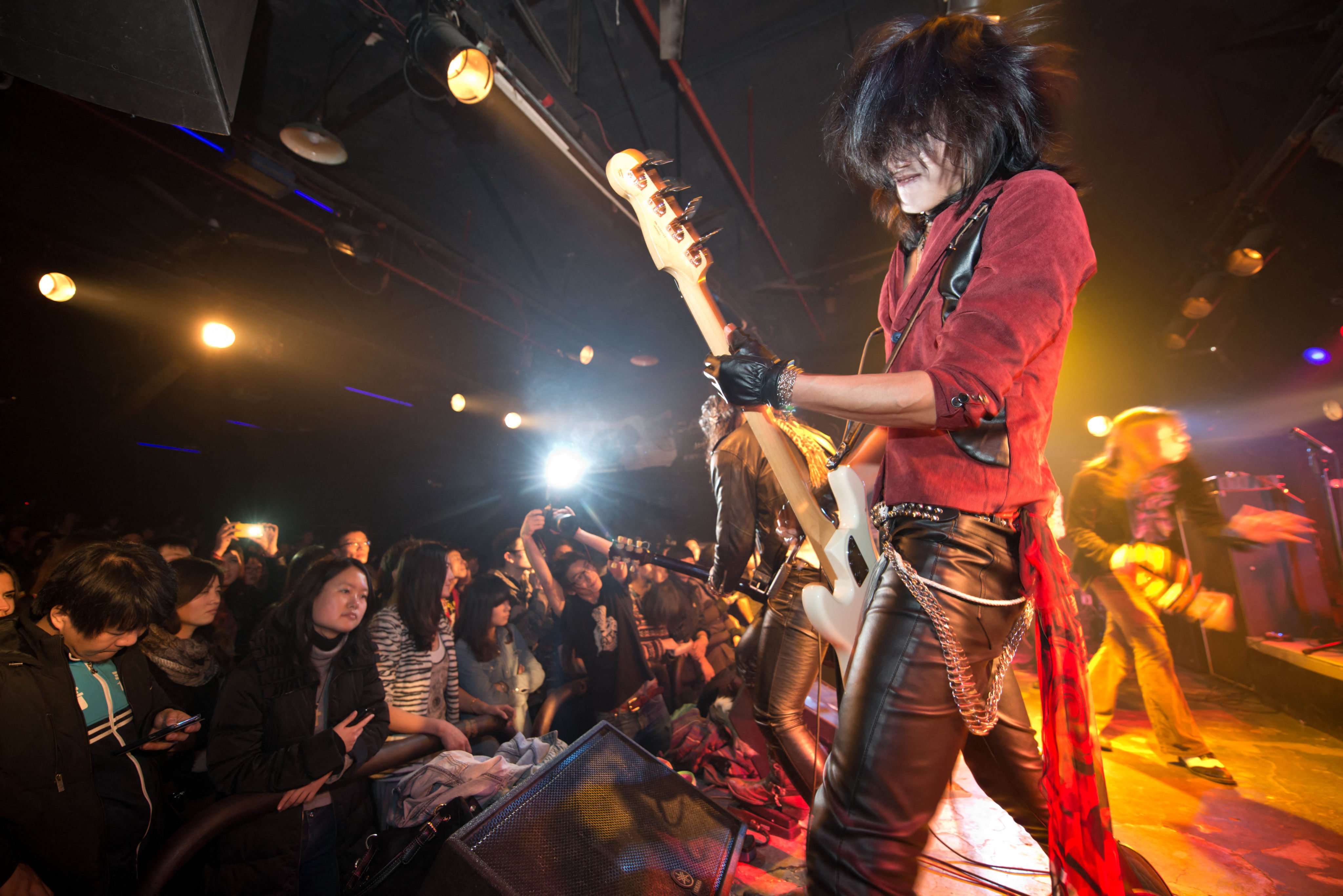
- Government censorship and police crackdowns have added to the virus and rising rents, decimating China’s underground music scene. There may be no way back
Like Beijing itself, Dusk Dawn Club – DDC to the locals who stumbled out at all hours – blended centuries of history into a neon blur. Located in the city centre’s trendy Gulou district, down one of its many winding, sparsely lit stone alleys, the club was housed in a traditional courtyard adorned with swinging paper lanterns and floridly carved wood eaves. Rock bands thrashed and flailed in a converted living room as fans spilled out onto the patio, jostling for a view through crooked window panes.
I visited Dusk Dawn Club on a warm spring night in 2019; Xiao Wang, a local riot grrrl band, headlined. Lead singer Yu Yang howled her indignation in Mandarin, eyes obscured beneath a serrated fringe, clawing at the coiled tiger on her tank top. The audience lunged toward her, amber bottles skittering like pinballs between their feet.
Today, Dusk Dawn Club is closed – one of many beloved small clubs to shut down lately, another silent shrine to a once-vibrant scene. In the short, embattled history of indie rock in China, its community has always been resilient. Its musicians have been imprisoned, silenced and socially exiled: forced from their homes, rejected by their families.
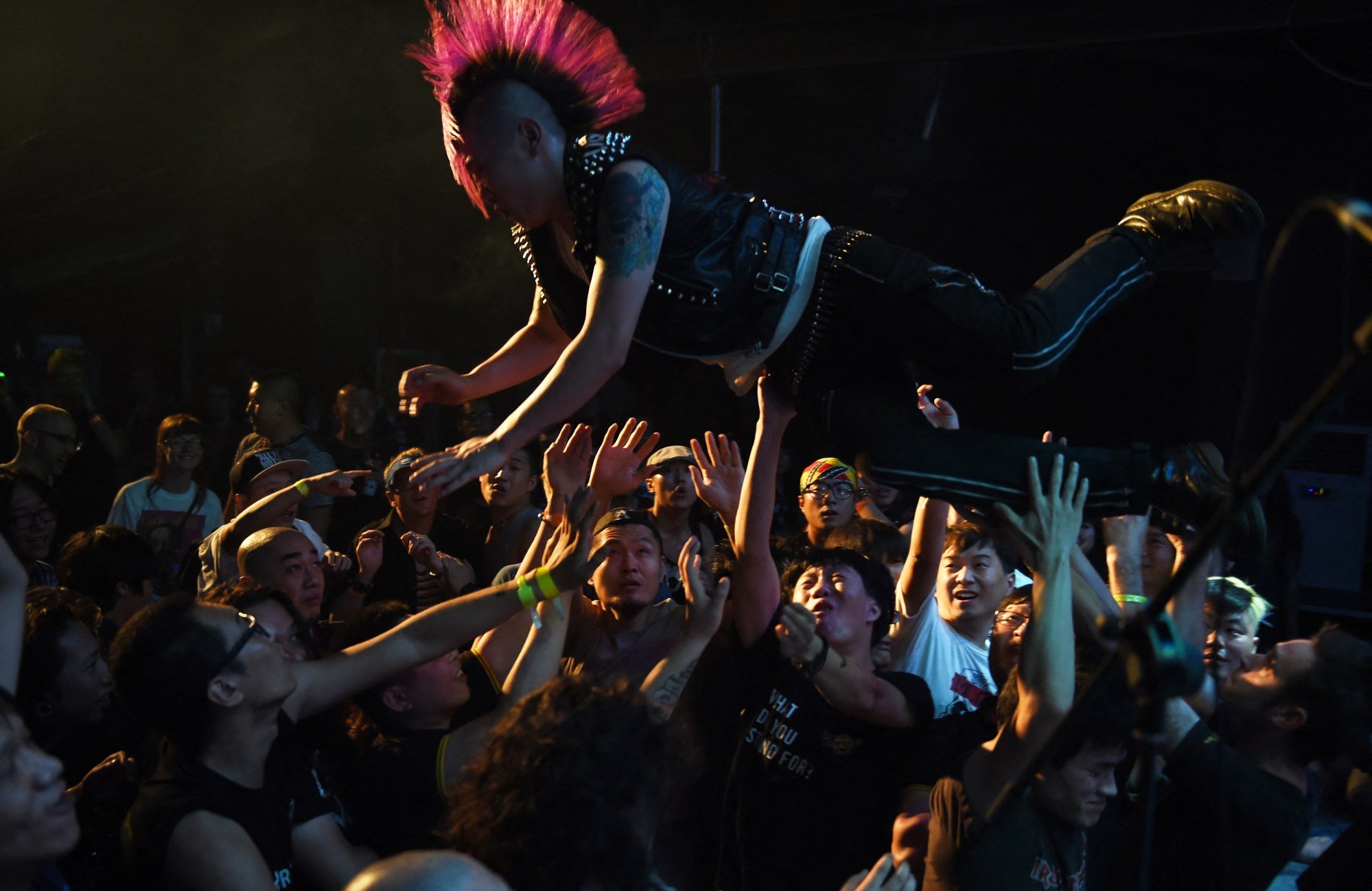
In a time of unprecedented prosperity and growth in China, the challenges to this scene may crush so much of what makes it extraordinary. And while disappointed fans might point to the pandemic that began 1,150km (715 miles) south, in Wuhan, that has only been one threat among many. Add a virus to rising rents, gentrification, government censorship and a series of well-choreographed police crackdowns and there may be no cure for what is happening to the Beijing rock underground.
Liu did not set out to sing about censorship and the police in China – and most of the time, he did not. New love, nights out with friends and other youthful tropes comprised most of the lyrics he wrote for his band. The handful of lines that could be interpreted as protesting the government or questioning authority were not intentional, he insists. I ask if he thinks those lyrics – and the excitement that they generated in the Chinese indie-rock community – played any factor in his imprisonment.
“I don’t know,” he says. “I really don’t know.”
Liu – name changed, as with some other bandmates – founded his band in the early 2010s, and it soon caught on in Beijing, booking shows at all of the city’s most popular livehouses. Soon, the bandmates were setting up their own tours around China. They borrowed more from Western punk than most of their peers: they howled gleefully about drinking and partying, their limbs covered in tattoos, all arch sneers and raised eyebrows to their elders.
“It is rare to create your own fan base in China,” says Liu. “Bands depend on their labels, and it takes like 10 years for a band to be known. But we did it ourselves.”
Labels soon came calling, and a prominent one released the band’s album. (It was an easy decision: Liu was “the best frontman in China”, one of the label’s top executives tells me.) It was a volatile, bratty record, powered by the scabrous guitar runs and frantic rhythms of Western garage rock, all topped with Liu’s shredding screams in Mandarin.
Chinese music press praised the band, especially English-language blogs, and trendy streetwear brands offered them partnerships. “We were receiving a lot of attention for what we represented,” says another band member, Winston, who was born and raised in the West. “Our attitude, our dressing, our perspective of life itself – it was different.”
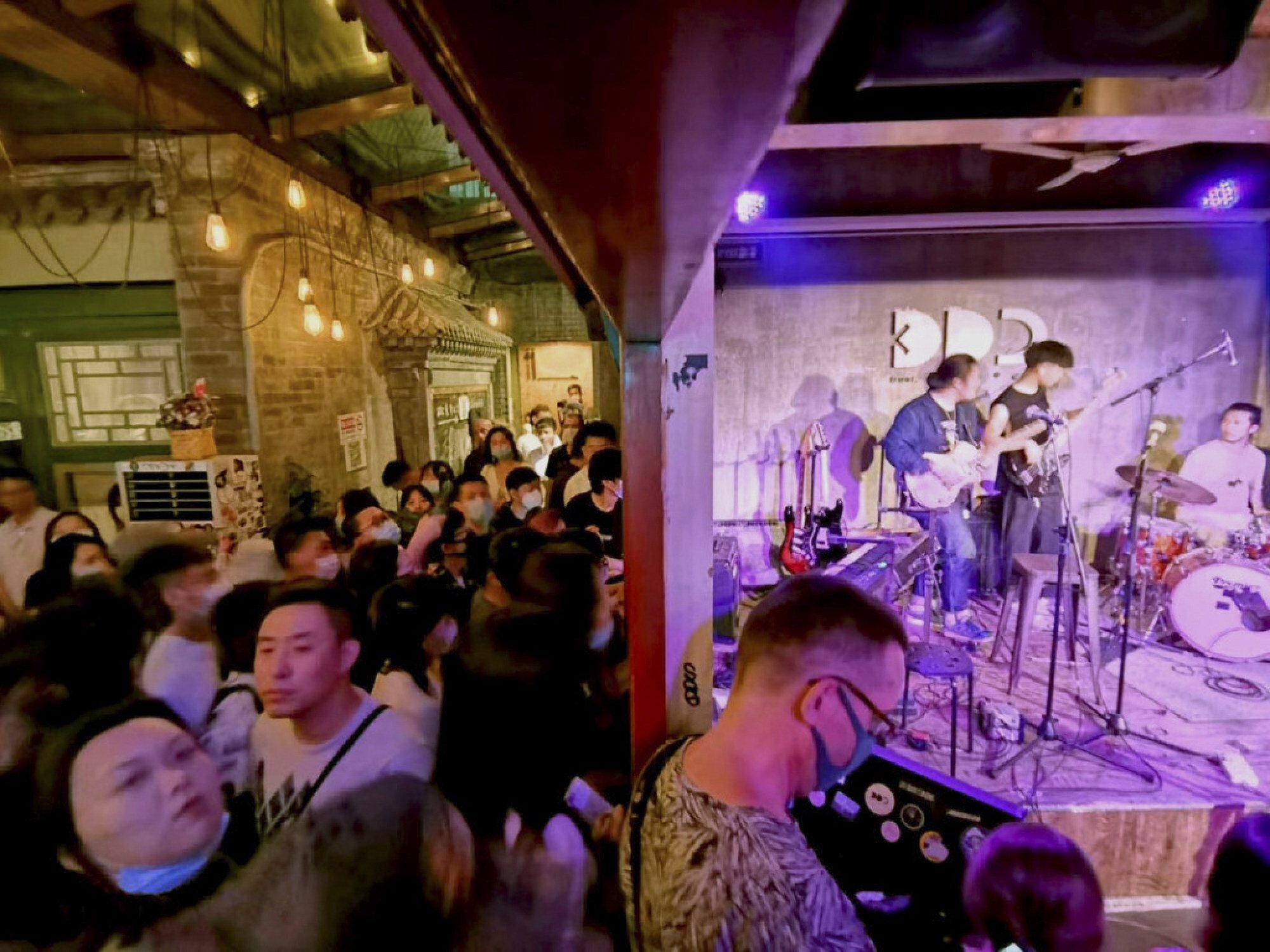
They were becoming poster children for the DIY ethos – that Western concept of punk – around China. But with their new celebrity, they were also attracting unwanted attention: the band claims that after one member upset a friend, she reported the band to the police, claiming they were dealing drugs in their home. Early one morning, police raided the band’s flat and detained Winston and Liu. Finding remnants of weed on a table, they jailed both musicians for several days.
Though these were Liu and Winston’s first arrests, it was not an unfamiliar situation to them: in the past decade, undercover police have become a reliable presence in the music scenes of China’s largest cities, especially Beijing and Shanghai. They will frequent a club or livehouse if rumours of drug use are reported, and their presence is guaranteed to scare away patrons. If a club is on the ropes financially, the presence of plain-clothes officers can accelerate its demise.
A concert promoter in Shanghai tells me that he and his friends often play “spot the cop” at shows, looking for the man in his 30s or 40s dressed in some exaggeratedly trendy outfit, a full beer bottle warming in his fist. Plain-clothes officers can, on a whim, demand urine tests from audience members and throw them in jail for any trace of drugs in their system. They have also been known to take stock of attendees and performers during shows, identify them using the government’s comprehensive surveillance technology, which incorporates phone and facial-recognition scanners, and appear later at their homes to collect hair samples, which carry longer-term traces of substances in them.
All our parents, teachers and friends agreed that if you listened to or played rock music, you were dangerous and destroying your life. People would treat you as if you were really bad and you didn’t belong in societyP.K. 14 frontman Yang Haisong
When the Shanghai promoter anticipates such a visit, he says, he shaves his head. A Beijing-based artist tells me that although raids are currently less frequent there than in Shanghai, he and his peers still sometimes bleach their hair after long nights out, to fry any traces of drugs.
“Before, plain-clothes police officers might watch a performance to see if a band was going to say something controversial or anti-government,” says a Beijing- and Shanghai-based record executive. “But now, their other forms of regulating have controlled that, so it’s just about drugs.”
Winston’s introductory stint in prison, after an alleged peer report, lasted less than a week. Today, he recalls the harsh blankness of his cell. “The walls, the floor – everything was white. And the light never turned off. It was winter, but the heat was not on.” His voice is grim and clipped, even through the international static of our call. “They have cameras in there, so they can see what you’re doing. At one point we were doing push-ups, and a voice came through the speaker in our room telling us to stop.”
Liu’s and Winston’s criminal records changed their daily life in China. Liu’s state ID card was permanently marked, and Winston’s working permit was also affected. Per police protocol, Liu could be forced to take a urine test any time he uses his state ID – to buy train or plane tickets or enter public buildings, or if stopped in a random check on the street. If his test showed any drugs, he would be sent back to jail.
Liu insists he went clean after his first arrest, and has not touched drugs since. He says he was forced to do spontaneous urine tests many times in the years after his arrest, but it was still a significantly lower number than usual for former inmates. “I was very careful,” he says. “I don’t use ID cards anywhere now. I use my passport.”
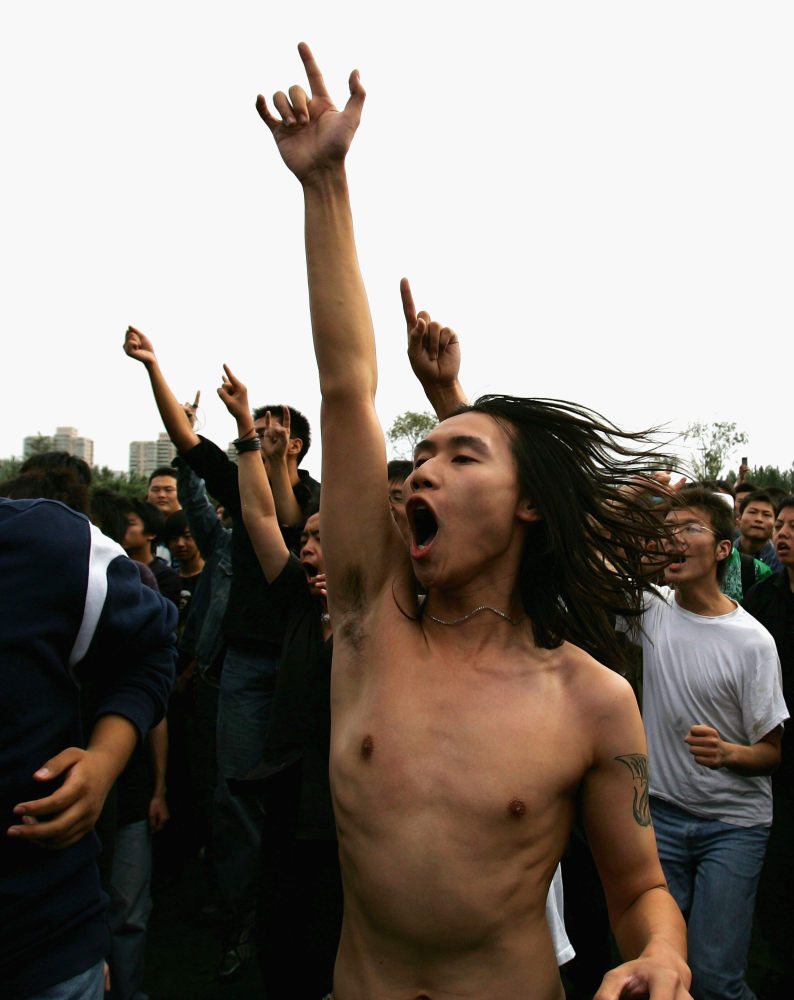
Despite this increased scrutiny, the months after the release of the band’s record were good ones. They were levelling up financially, commanding enough to live comfortably on just their music. They booked shows around China and started organising a tour that would take them outside the country. They wrote material for a new album.
But one morning, just before the band were scheduled to depart for a major show, police raided their home again. This time, Winston was not there, but Liu was. Police took Liu to the local precinct, saying he had again been reported for drug use. The police tested Liu’s urine and hair, and claimed to have found evidence of drugs. Despite Liu’s protests, he was sentenced to two years in a rehabilitation prison.
Winston – who was midway through his routine visa renewal – was brought in by police separately for questioning in order to receive his passport back. “When I arrived I was completely shaved: my whole body, eyebrows, beard,” Winston says. “Not because I thought I was guilty, but because I didn’t want to give them any chance to put something against me.”
After a quick, cordial interview, he left and soon received his passport in the post. This time, instead of being granted his normal visa of several months or a year, he had been allotted just a few weeks. “It seemed like they were asking me to leave gently.” He returned to his home country. The band’s tour and next album were cancelled.
In his first weeks in prison, Liu had persistent insomnia. “It felt unreal,” he says. “I just couldn’t believe this was happening to me. I had to find a way out, mentally.” He began reading fervently, and chatted with his many cellmates, all of whom were significantly older and serving even longer terms for alleged drug use. He meditated. His arrest was not reported in any Chinese media.
“In the West, if a band got arrested like this, someone would probably spew it to the media and fans, and society would rally around the band,” says Winston. “But if we said stuff like this in Chinese media, people would automatically dissociate themselves from us to protect themselves. When you live in a dictatorship mentality, you don’t want to get in trouble.”
Liu quietly endured his time in jail. The night before he was released, his cellmates threw him a party in their cell, complete with a cake made of fresh fruit that they had somehow acquired. “It was quite delicious,” Liu recalls. The next day, his mother and girlfriend picked him up; they went for dinner, and then Liu met some of his bandmates at their favourite bar. They did not talk much about his time in prison.
“Being a band from the underground, we were getting too much attention,” Winston says. “When we started, we were presenting something that had never happened before in China. We were covered in tattoos and young. Some of us had dropped out of school. Our music struck the critical mind: that you can do things by yourself, think by yourself, and you don’t need to follow the traditional path […] And if you observe the history of China, every time the government feels something is out of their control and getting too big, they try to suffocate it.”
But Liu disagrees. “We’re nobody to them,” he says. “It’s just about the drugs. They don’t like that, so because [we were associated with them], they punished us. Of course they know what we’re doing musically, but we were quite small for them.”
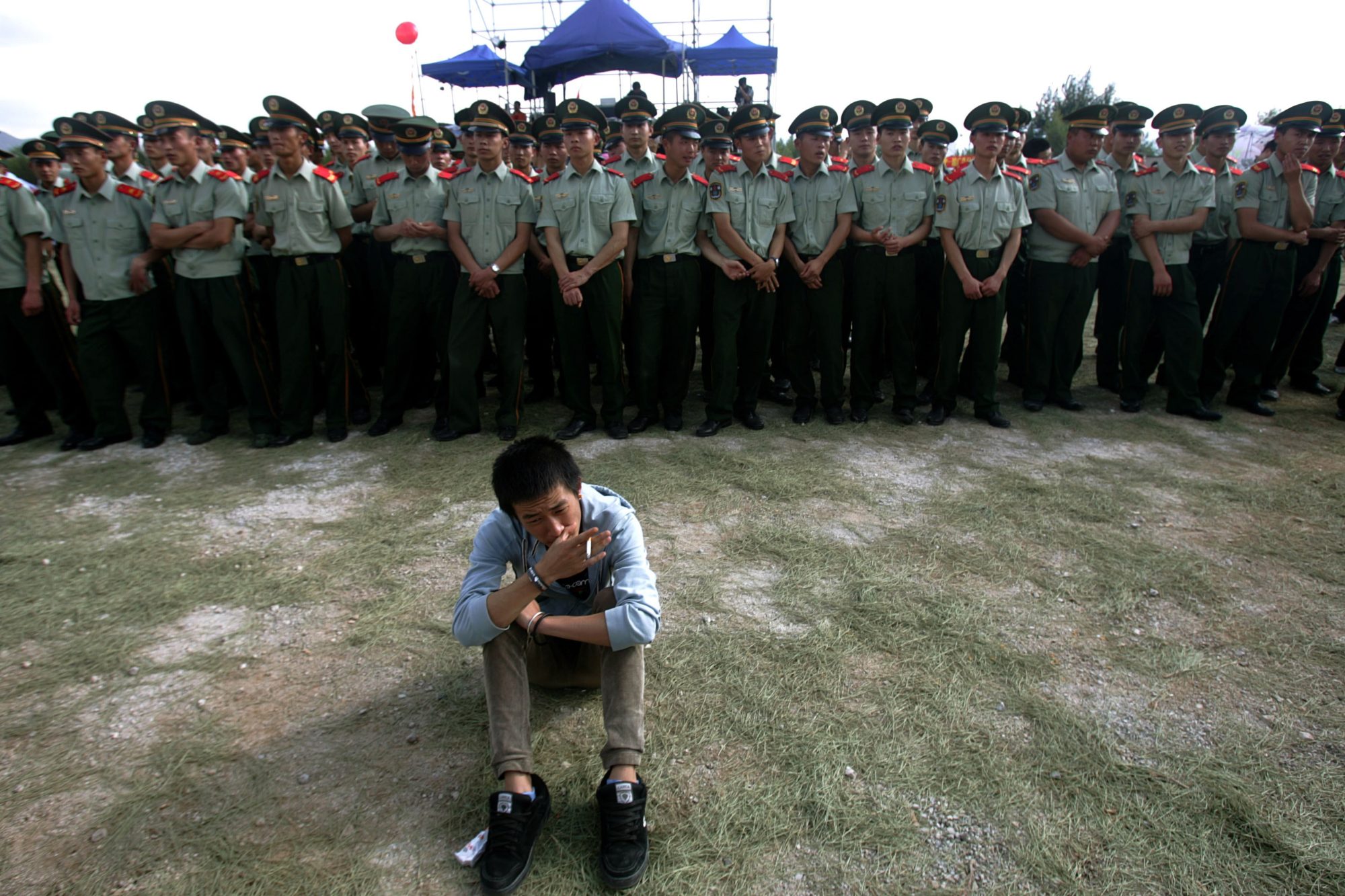
Ultimately, the band’s different interpretations divided them. “I’d already felt before that, every time we played, we had heavy surveillance,” says Winston. “Now it was clear: we’d reached the ceiling and there was nowhere for us to go in China. We had to leave the country to move forward.”
Winston begged his bandmates to join him in the West, even temporarily. He dangled potential producers and bands as collaborators; he predicted catastrophic outcomes if they stayed in China. But “they were raised and born in that environment, and they’ve never left. They’re more willing to submit to what the system offers to them and to adapt towards the way things operate.”
For now, without their Western member, the band is playing shows again and planning to record another album. Liu is also working on new songs, with lyrics he began writing during his time in prison. “They’re not about jail, they’re about the world,” he says. “Because I feel like the world is just a bigger jail.”
In the 1990s, while rock was verboten in China, record companies in the West were printing classic- and alt-rock CDs in unprecedented volumes. With unsold copies ultimately returned to them from stores, these labels needed to dispose of this overstock, so they embraced an increasingly popular option in other industries: they shipped these CDs and cassettes to China to be recycled or junked.
People always ask us why we’re not being critical of censorship, which I think is unfair. In China, first of all, we have to make sure we keep playing musicZhang Shouwang, frontman, Carsick Cars
“Once I found blood on my hand, and it was from other people,” says Zhang Shouwang, frontman of veteran Beijing rockers Carsick Cars. “We were so eager for new music, we were just grabbing everything we could.”
These shipments of Western albums sparked a second, late-90s rock wave in China. Bands found clever ways to merge their Western influences with Mandarin. Influential Beijing rock groups such as Black Panther, the Flowers, and Hang on the Box released landmark albums and, in some cases, embarked on previously unheard of national tours. To the south, in Nanjing, the now-revered P.K. 14 formed, drawing inspiration from Joy Division and other 80s post-punks.
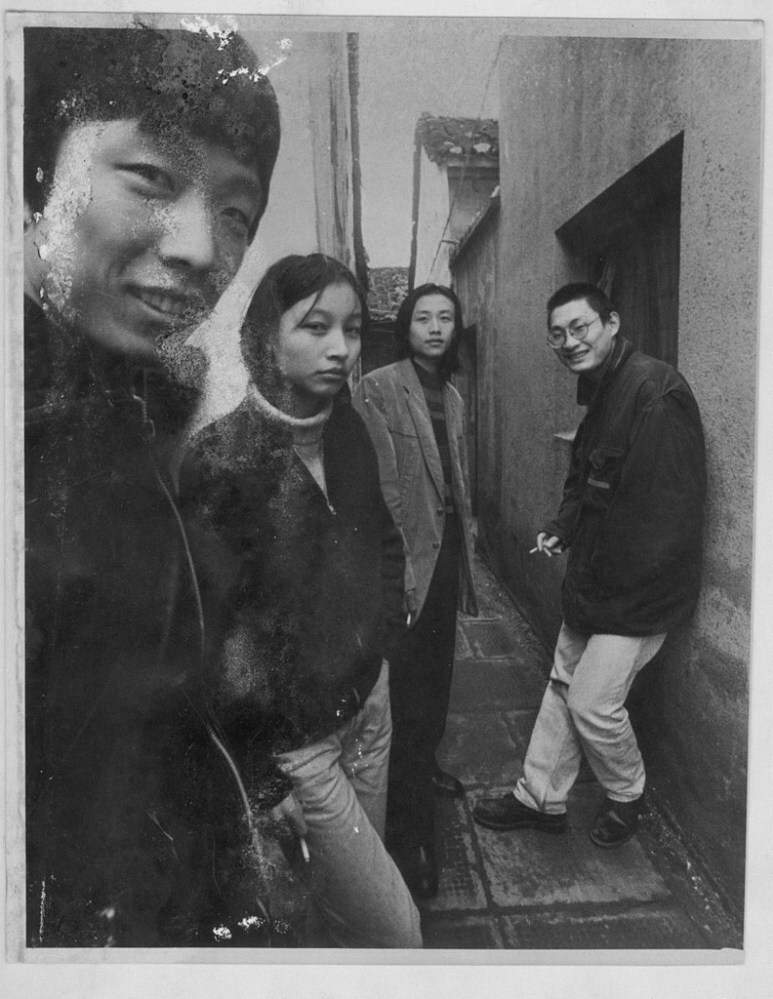
But as it grew, rock music was met with consistent hostility. P.K. 14 moved to Beijing not long into their career, frontman Yang Haisong says, to escape the stigma of being rock musicians. “All our parents, teachers and friends agreed that if you listened to or played rock music, you were dangerous and destroying your life,” recalls Yang, now a prominent rock producer. “People would treat you as if you were really bad and you didn’t belong in society. You were an outsider.”
It was a much less glamorous fringe status than their counterparts were enjoying in the West. Yet with no financial incentive, and no social safety net, this generation of Chinese rockers endured, grinding out albums and demonstrating a rare display of artistic passion above commerce. Today, to a new era of Chinese rockers, they are cult icons.
Shen Lihui, frontman of the college-rock group Sober, founded Modern Sky, now the largest indie label in China, and staged the company’s first festival, headlined by the Yeah Yeah Yeahs. Rock clubs drew lively, loyal crowds; D22 in Beijing, founded by Michael Pettis, is talked about in the same sepia tones as CBGB in New York. (D22 closed in 2012.)
“The Chinese government wants to control the speech and ideas of people who want to be independent,” says Yaqiu Wang, a China researcher at Human Rights Watch. “The government considers anybody who wants autonomy, wants agency, wants to explain their own ideas as a threat to its rule.”
One sunny afternoon in Beijing, while walking alone to my Airbnb in the well-heeled Sanlitun district, I was introduced via a messaging app to Winston, who had already been deported to his home country in the West. The exchange was short; we agreed to a call the following week, when I would be back in the United States.
Within minutes of our exchange, the messaging app crashed on my iPhone. I was startled and tried to reboot it, but it did not reopen; it was locked on my device. I attempted to open the local ride-sharing app I’d relied on for transport. It also did not open.
About 15 minutes later, outside a pavement cafe, I attempted to open both apps again, to no avail, and I noticed a man in my peripheral vision, about six metres away: short, with a shaved head, wearing a white T-shirt and jeans, with a black messenger bag slung diagonally across his chest. He was watching me intently. I walked down the block and turned back quickly; he had not moved, and was still staring.
The messaging and ride-sharing apps reopened on my phone a few hours later, within minutes of each other. I saw this same man, in the same outfit, twice more the next day, on both occasions within a few blocks of where I was staying. He was watching me intently both times; both times, I was alone. And both times, as I scurried to lose him on the street, I wondered how much of this was blatant surveillance. The not knowing was more frightening than his vigil, which felt like a reflection of the power of monitoring itself.
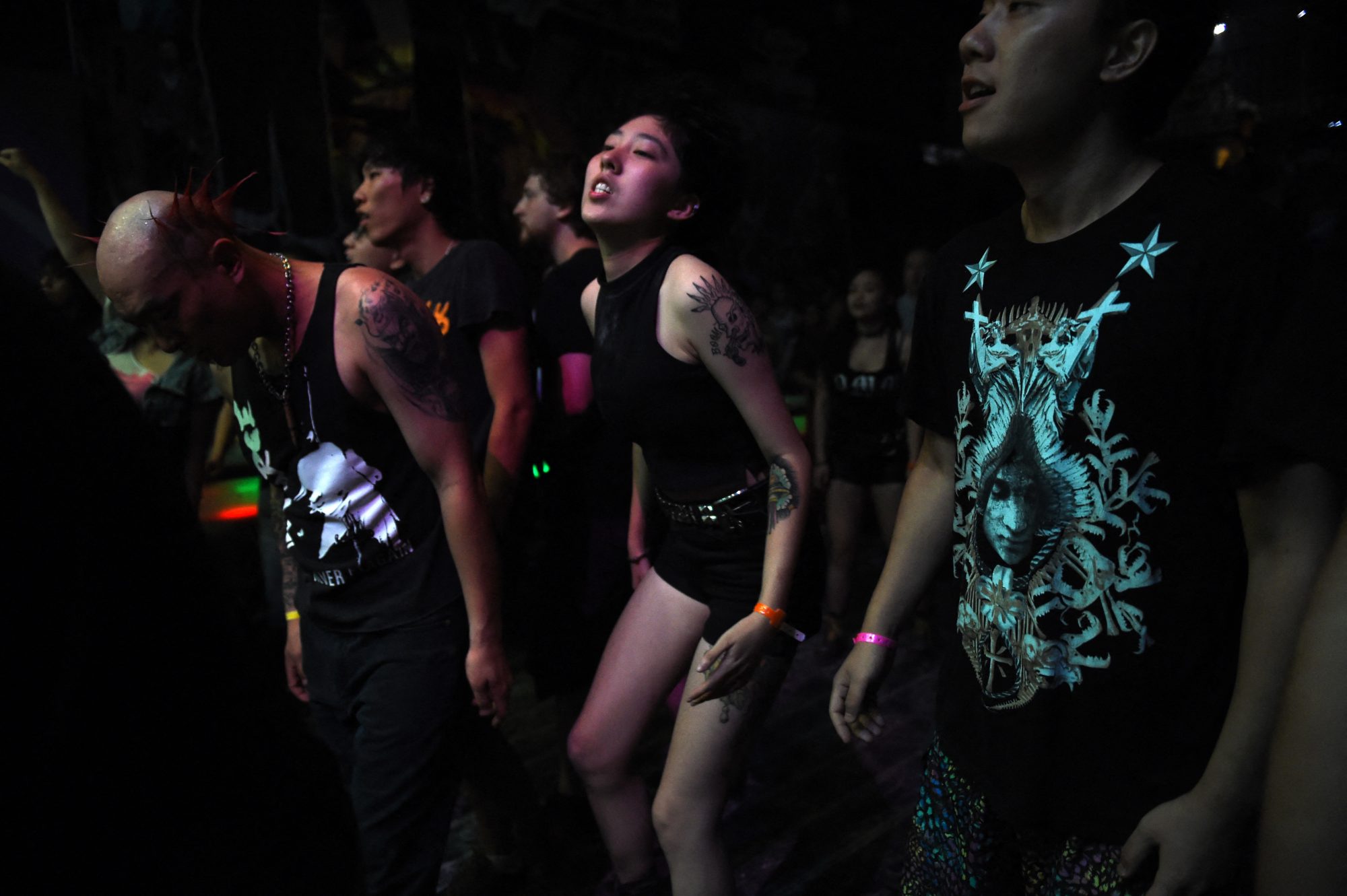
Jasmina Lazovic, programme coordinator of global monitoring at Freemuse, an international NGO that advocates for freedom of artistic expression, says the Chinese government is “very much aware of how people can be mobilised through music and art […] Keeping in mind the scope of human rights violations in China, [artists’ safety] is another area that needs to be emphasised and advocated at the international level.”
Western artists have also been barred from the country after expressing support for the independence of Tibet, over which China has imposed sovereignty since 1950. After Björk yelled her support of Tibet during a 2008 concert in Shanghai, she was forbidden from performing in China again. Other artists who have performed in Tibetan Freedom concerts or publicly supported the Dalai Lama have reportedly been banned, too, including Lady Gaga, Oasis and Maroon 5.
While in Beijing, I found Björk to be a telling barometer of the Great Firewall. Entering “Björk” into Baidu, the search results offered a few, scant biographical details and an abridged discography. Entering “Björk” with “Tibet” revealed no information about that controversy.
To release an album, Chinese artists and labels must first navigate bureaucracy behind the scenes. “Everything goes through a censorship process now, but there’s no one censor, and no clear list of what’s allowed and what’s not,” says Nevin Domer, a metal musician and former operations manager at independent label Maybe Mars.
“To release albums, you need to submit all your materials to a publisher, which is a partly government-owned company that [a label] has to pay. If the label doesn’t get their approval, the factory can’t print the album.”
The materials include all song lyrics, information about band members, their government IDs, the recorded songs and everything to be printed in the liner notes. These publishers can be capricious in their verdicts, and if an album is denied – as it often is – a label will usually reapply with another company and begin the entire process again.
“It’s a fundamental strategy of censorship, jumping through bureaucratic hoops,” says Human Rights Watch’s Wang. “The control is from the very root.”
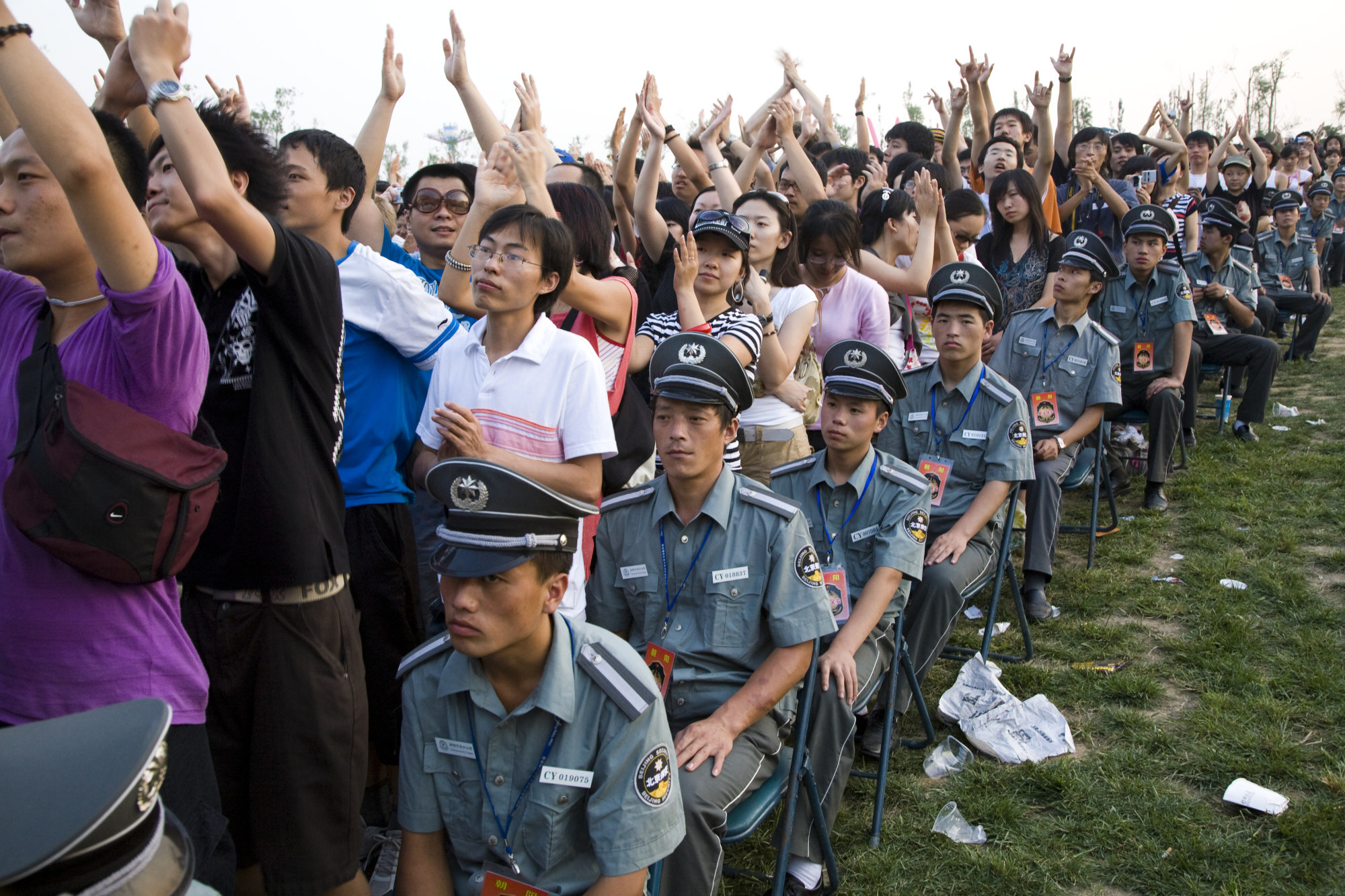
Musicians who have navigated this process say the spectre of censorship still follows them everywhere, particularly when talking to Westerners. But to some of them, it is even more important that they not be defined by their response to such suppression. To these artists, resistance is about continuing to create art in a system that antagonises them. In this climate, the punk ethos is to create something full of beauty – of optimism, even – for as long as you can.
“People always ask us why we’re not being critical of censorship, which I think is unfair,” says Carsick Cars’ Zhang. “In China, first of all, we have to make sure we keep playing music. I think this environment gives us even more creativity to write about what matters to us.”
P.K. 14’s Yang echoes this. “I don’t want to write songs against something. As an artist, that’s a trap,” he says. “As a musician, you need to write your feelings, to find yourself. It can’t be only anger. I don’t want to fight using my words; that’s bad for me.”
When Zhang Jincan opened Dusk Dawn Club in 2014, Beijing’s Gulou neighbourhood was full of scrappy rock livehouses. There was School Bar: a dim, sticky punk den located down the road from a gilded Buddhist temple and a KFC. A few blocks over was Temple Bar: a wide, smoky loft in an industrial mini-mall that felt ripped from a Midwestern basement. Then Yugong Yishan, a courtyard dive with regular international acts, photography exhibits and the largest sectional couches in the Eastern Hemisphere. And the most famous of them all, Mao Livehouse: a boxy, heavily graffitied hall with the best, most ear-splitting sound system in town.
Today, only School Bar remains open. “I walked around Gulou recently and it’s totally different now. It’s quiet. Too quiet,” says Zhang. “I don’t think the music scene has a chance in the city centre any more. It’s lost; it’s gone.”
Dusk Dawn Club and Temple Bar were the two most recent to close. Predictably, Beijing’s coronavirus lockdown played a role; livehouses were closed for more than eight months and were some of the last businesses to reopen in the city, along with cinemas. Dusk Dawn Club was hit hard by the lack of income and ever-shifting reopening projections. “By May [2020], we had no hope that the pandemic in China would get under control,” says Zhang. “It was a disaster for us.”
To hold a concert in China, performance licences are required for both the artist and venue, and both can be difficult to obtain. The artist must submit their lyrics, ID and video footage of prior performances to a censor, who might deem them offensive and reject their application, much like the process for releasing an album.
People are wrong that most of the pressure on the scene is coming from the government. It’s coming from economic revitalisation
People are wrong that most of the pressure on the scene is coming from the government. It’s coming from economic revitalisationHelen Feng, frontwoman, Nova Heart
Clubs must be located within city-designated “cultural zones” to receive such permits, and in Beijing, these zones tend to appear far from the city centre. After Mao Livehouse closed in 2016, reportedly because of “rising rent and meddlesome officials”, it reopened in one such approved zone, almost 80km from Gulou.
“It will only be a matter of time before local governments squeeze the remaining venues out of the city centre that have been able to stay there because of their guanxi – their connections – and because they’ve been there for several years. But eventually, they’ll be pushed out,” says Domer. “The only spaces for venues will be in spaces designated for arts and culture.”
For his part, Dusk Dawn Club’s Zhang believes this community can persevere in Beijing, with some compromises. He is currently focusing on the club’s sister venue, DDC Aranya, a performance space in a well-heeled, private beachside community about 300km from the capital. But he plans to open a new DDC location in Beijing in the autumn, inside a mall in Chaoyang, a district east of Gulou, so not as far a displacement as other livehouses have faced.
“I feel very lucky,” he says. Still, he acknowledges the area does not have much of a music scene, and that another recently relocated club in the area, Lantern, was closed by the government after just one month of operation. But “I told the landlord my worries about this, and they said they will give me help if I need it”.
Helen Feng, frontwoman of Beijing rockers Nova Heart and a former MTV China VJ, stresses that this censorship of music, and the increased scrutiny of livehouses, are not efforts to suppress art so much as to support greater gentrification and economic development in city centres.
“People are wrong that most of the pressure on the scene is coming from the government. It’s coming from economic revitalisation,” says Feng, who splits her time between Beijing and Berlin, in Germany.
“It’s not like in the music community you’re this medic who’s running into the field and everybody is bleeding and you need to patch them up, and you have a noble purpose. It’s more like you run into the field and the enemy is just doing a general spray, and you just happen to be in the way.”
This urban gentrification and restructuring – which, Party messaging repeatedly celebrates, is boosting the country’s middle class – may also be a temporary boon before sharper economic decline. “You have to be an idiot to think that everything’s always on the upswing, and it’s been on the upswing for 40 years in China. No real economy can sustain that; it’s impossible,” says Feng.
“China is a totalitarian government that is terrified of its own people, which is a very unique thing. And a terrified totalitarian government is going to make certain moves very quickly that democracies cannot.”
Carsick Cars’ Zhang notes that these new livehouses being built far outside the city in culturally approved zones have large capacities, often more than 500, and “maybe that’s the downside of this growth […] Everything will be more commercial,” he says.
“A lot of small clubs are closing and very big venues are opening, but young bands can’t afford to play those. So they are doing research on what the most people will like, and playing that.”
